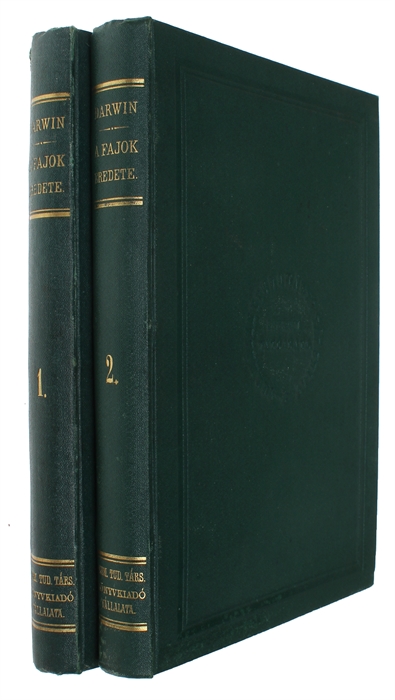THE FIRST HUNGARIAN "ORIGIN OF SPECIES"
DARWIN, CHARLES.
A fajok eredete a természeti kiválás útján vagyis az elonyös válfajok fenmaradása a létérti küzdelemben. [Hungarian - i.e. On the Origin of Species... Translated by Dapsy László and revised by Margó Tivadar]. 2 vols.
Budapest, Kiadja a Természettudományi Társulat [Academy of Sciences], 1873 & 1874.
8vo. In two contemporary embossed full cloth bindings with gilt letter- and numbering to spine. Bindings with light wear, primarily affecting hindges. Previous owner's stamp to half title and title page in both volumes. Light occassional brownspotting, primarily affecting first and last leaves. An overall nice copy. XVI, (2), 303, (1); VII, (1), 361, (1) pp. + 1 leaf of Advertisement + 2 plates (A frontiespiece of Darwin and one listing the evolution of the different generations).
The exceedingly rare first Hungarian translation of Darwin's "Origin of Species". Together with the Serbian and the Spanish, the first Hungarian translation of the "Origin" is arguably the scarcest of all the translations of the work and very few copies of it are known.
The Hungarian public was introduced to Darwinism early on when Ferenc Jánosi reviewed The Origin of Species in the Budapesti Szemle (Budapest Review) half a year after it first appeared in English. Darwin's principal works were first published in Hungarian translation by the Royal Hungarian Natural Science Society (Királyi Magyar Természettudományi Társulat).
Translator Dapsy László had been actively working to make Darwin and his idea known in Hungary. Through his articles, he consistently presented Darwinism as a possible model for the type of progressive society that Hungary should attempt to achieve, thus being one of the very earliest to apply Darwin's theories to human society and politics in general. "Dapsy's translation, inspired by liberal ideals of progress, increasingly became part of the conservative discourse of Hungarian politics, reinterpreted and appropriated according to the nationalist agendas merging in Hungarian Society". (Mund, The Reception of Charles Darwin in Nineteenth-Century Hungarian Society).
Prior to his translation in 1872, Dapsy wrote Darwin: "I am sorry to say that as yet, here such tendencies are received with a good deal of aversion, but I believe that by-and-by they will accept it, and it would be a great advancement for our political life too". (Dapsy to Darwin, 12 June 1872). Darwin's response is not known.
"It is characteristic of the enlightened spirit of the country in this period that Darwin received academic recognition earlier in Hungary than in England. Although Cambridge did not honor Darwin until 1879, he was elected an honorary member of The Hungarian Academy of Sciences in 1872, the same year on this occasion the renowned Hungarian zoologist Tivadar Margó visited him at Down.
Historical circumstances played a major role in this quick appearance of Darwinism and its popularity in Hungary. The failure of the 1848-49 revolution and war of independence seemingly put an end to progressive political discourse, signaling an ideological crisis among the intelligentsia. In this context, the natural sciences with their 'eternal truths' promised a way out, inasmuch as science's promised objectivity might well serve as a politically neutral expression of progressive values" (Mund, The Reception of Charles Darwin in Nineteenth-Century Hungarian Society).
The present book was one of four scientific works published between 1872 and 1874 by the Hungarian Academy of Sciences, the others being Bernhard von Cotta's Geologie der Gegenwart (1865), Huxley's Lectures on the Elements of Comparative Anatomy (1864), and Tyndall's Heat Considered as a Mode of Motion (1863). An advertisement for these books occurs on the final leaf of vol. II.
During Darwin's lifetime, 'Origin' was published in eleven different languages, some of them in more than one edition: The first foreign translation was the German (1860), followed by a Dutch (1860), French (1862), French (1862), Italian (1864), Russian (1864), Swedish (1869), Danish (1872), Hungarian (1873), Spanish (1877) and Serbian (1878), the last three by far being the rarest.
OCLC locates only three complete copies: Paris Mazarin Library, University Library of Szeged and The Huntington Library, CA. Staatsbibliothek zu Berlin only hold volume 1.
Freeman 703.
Order-nr.: 60158


![A fajok eredete a természeti kiválás útján vagyis az elonyös válfajok fenmaradása a létérti küzdelemben. [Hungarian - i.e. On the Origin of Species... Translated by Dapsy László and revised by Margó Tivadar]. 2 vols.](/images/product/60158b.jpg)
![A fajok eredete a természeti kiválás útján vagyis az elonyös válfajok fenmaradása a létérti küzdelemben. [Hungarian - i.e. On the Origin of Species... Translated by Dapsy László and revised by Margó Tivadar]. 2 vols.](/images/product/60158c.jpg)
![A fajok eredete a természeti kiválás útján vagyis az elonyös válfajok fenmaradása a létérti küzdelemben. [Hungarian - i.e. On the Origin of Species... Translated by Dapsy László and revised by Margó Tivadar]. 2 vols.](/images/product/60158d.jpg)
![A fajok eredete a természeti kiválás útján vagyis az elonyös válfajok fenmaradása a létérti küzdelemben. [Hungarian - i.e. On the Origin of Species... Translated by Dapsy László and revised by Margó Tivadar]. 2 vols.](/images/product/60158e.jpg)
![A fajok eredete a természeti kiválás útján vagyis az elonyös válfajok fenmaradása a létérti küzdelemben. [Hungarian - i.e. On the Origin of Species... Translated by Dapsy László and revised by Margó Tivadar]. 2 vols.](/images/product/60158f.jpg)
![A fajok eredete a természeti kiválás útján vagyis az elonyös válfajok fenmaradása a létérti küzdelemben. [Hungarian - i.e. On the Origin of Species... Translated by Dapsy László and revised by Margó Tivadar]. 2 vols.](/images/product/60158g.jpg)
![A fajok eredete a természeti kiválás útján vagyis az elonyös válfajok fenmaradása a létérti küzdelemben. [Hungarian - i.e. On the Origin of Species... Translated by Dapsy László and revised by Margó Tivadar]. 2 vols.](/images/product/60158h.jpg)
![A fajok eredete a természeti kiválás útján vagyis az elonyös válfajok fenmaradása a létérti küzdelemben. [Hungarian - i.e. On the Origin of Species... Translated by Dapsy László and revised by Margó Tivadar]. 2 vols.](/images/product/60158i.jpg)